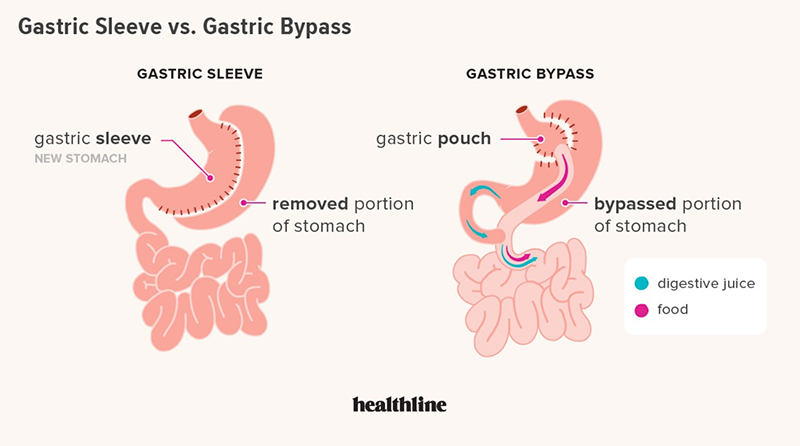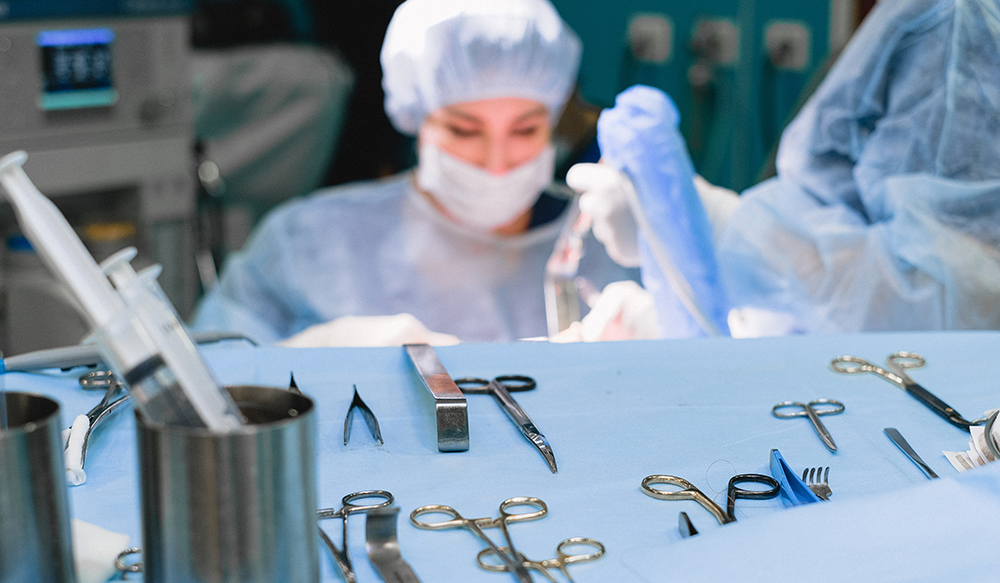
The Gastric Bypass and the Gastric Sleeve are two weight loss surgery procedures that effectively reduce weight. Aside from the obvious weight loss benefits, the Bypass and the Sleeve also effectively create a metabolic and hormonal effect that results in the improvement and cure of many weight-related medical problems, including diabetes, hypertension, sleep apnea, high cholesterol.
The Gastric Bypass and the Gastric Sleeve are excellent options for patients with a body mass index between the mid-30s and upper-40's. The Sleeve is traditionally recommended for patients with a BMI between 35 and 45, while patients with a BMI between 40 and 50 see better results with the Bypass.
Although both the Gastric Bypass and the Gastric Sleeve will help you lose weight, some differences need to be noted. First off, the method in which they are performed and how they assist with weight loss is entirely different.
The Gastric Bypass
The Gastric Bypass, more formally known as the Roux-en-Y (RNY) Gastric Bypass, is a procedure in which we alter the intestines' anatomy and therefore change the path of the food. The procedure works by creating a small stomach about the size of an egg, which will then directly connect to a piece of the small intestine, bypassing the main stomach (hence the name Gastric Bypass). During the Gastric Bypass procedure, the surgeon will also shorten the small intestines by about 30%.
As a result, patients will feel full faster, even when only eating about half the amount of food they used to consume. And since weight gain results from the overconsumption of calories relative to the amount burned, the Gastric Bypass works to encourage weight loss by restricting the amount of calories consumed.
The Gastric Sleeve
The Gastric Sleeve, otherwise known as the Vertical Sleeve Gastrectomy (VSG), is a procedure in which the size and the shape of the stomach are changed.
The Vertical Sleeve Gastrectomy involves placing a tube through the mouth into the stomach along the lesser curve. The surgeon will divide the fat attachments along the greater curve of the stomach. Then, using laparoscopic staplers, the surgeon will divide the stomach along the tube, beginning on the lower edge of the stomach (near the pylorus) to the upper edge (near the esophagus).
The surgeon will remove about 70 to 80% of the stomach, leaving a banana-shaped pouch. Unlike the Gastric Bypass, the Sleeve will not alter how food travels through your intestines.
The Gastric Bypass vs. The Gastric Sleeve
Weight Loss Expectations
When comparing the Gastric Bypass and the Gastric Sleeve, most patients want to know the expected weight loss. The Gastric Bypass has an average of 70 to 75% excess weight loss, whereas the Gastric Sleeve has an average of 60 to 65% excess weight loss.
It is important to understand that when we as surgeons refer to "excess weight," we are not talking about total weight. Excess weight loss is a percentage of your excess body weight. For example, if you are 200 pounds and your goal is to be 100 pounds, then you have 100 pounds of excess weight.
The Gastric Bypass is more likely to help you lose a more significant percentage of your excess weight compared to the sleeve.
Health Impact
Aside from weight loss, it is also important to look at the health benefits and risks of the two different bariatric procedures.Due to the effectiveness of weight loss that the Gastric Bypass has, this procedure sees better chances of curing diabetes and has some degree of protection from redeveloping diabetes in the future.

The Gastric Bypass is also advantageous for patients who experience gastroesophageal reflux disease, which could resolve the symptoms as soon as the next day after surgery. We do not recommend the Gastric Sleeve for patients with gastroesophageal reflux disease because it could cause severe symptoms that are extremely difficult to control, aside from having a revision.
On the contrary, though, because the Gastric Bypass is more involved, there is a slightly higher risk of complications. Similarly, the intestinal Bypass will result in the malabsorption of nutrients, leading to nutritional deficiencies if you do not take your vitamins.
The Gastric Sleeve is the least aggressive of staple bariatric procedures (Bypass, Sleeve, and Duodenal Switch), and it is easier to advance your diet after this procedure.
Conclusion
With all the information given above, you may be wondering what bariatric procedure is best for you. When you come in for your initial visit with your bariatric surgeon, we will review your weight, medical history, and any health conditions that could impact your results. We will also want to understand your weight loss expectations to help you choose the best weight loss procedure to fit your lifestyle.
However, we encourage you to continue to do your research so you have a thorough understanding of what bariatric procedure to have.











